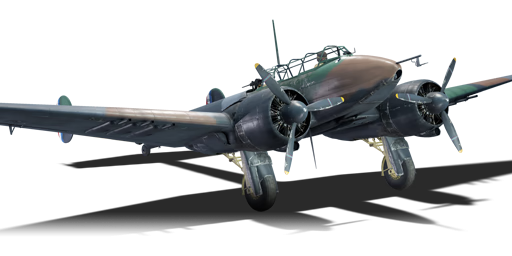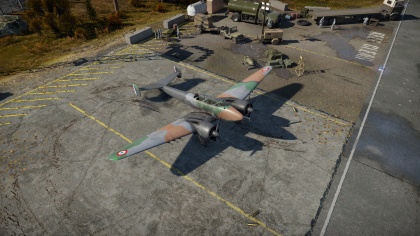Potez 631
Contents
Description
The Potez 631 is a Rank II French twin-engine fighter
with a battle rating of 2.7 (AB), 2.3 (RB), and 2.0 (SB).
The SNCAN Potez 631 was the second production variant of the Potez 63 project, which was a project intended to provide France with modern heavy fighter capabilities and which eventually led to one of the most prolific and versatile series of combat aircraft to be built by the French aeronautical industry at the beginning of World War II. The 63 series, originally conceived in 1934, yielded not only strategic fighters, but also light bombers as well as attack and reconnaissance planes, resulting in the production of more than 1,100 aircraft of different variants in the series by June 1940. This elegant aircraft remained in active service during German occupation, and approximately 250 additional planes built in that period were used by the Luftwaffe as transport and liaison aircraft of the Vichy Air Force, the Italian Regia Aeronautica, and of the Rumanian Air Force.
In War Thunder, the Potez 631 is a Rank I French twin-engine fighter with a Battle Rating of 2.0 (AB/SB) and 2.3 (RB). It appeared following the introduction of the Potez 630 in Update 1.73 "Vive la France". Its armament features the last-ditch French effort to upgrade the aircraft before the outbreak of hostilities, equipped with 2 x 20mm underbelly cannon and 6 wing-mounted 7.5mm machine guns, along with a single 7.5mm rear-facing defensive turret.
General info
Flight Performance
The Potez 631 is a slow climber and heavy lander, with a stall speed of 138 km/h (SB, 45 min fuel, full ammunition, no bombs), but is very stable in high-speed dives and turns and can be lethal when used properly as an energy fighter. Its maximum speed is modest at 332 km/h @ 4,000m (SB, 45 min fuel, full ammunition, no bombs) but maneuvers surprisingly well at medium and high speeds, and the canopy provides excellent 360-degree visibility.
Survivability and armour
The Potez 631 has minimal armor and is relatively fragile, and highly vulnerable to damage from the front which makes it less-than-ideal as a high-level interceptor.
- No armor plating
- No armor glazing
- Critical components located in front of aircraft (fuel, pilot, engine, controls)
Armaments
Offensive armament:
The Potez 631 is armed with:
- 6 х 7.5 mm MAC 1934 machine gun (300 rpg = 1800 total rounds)
The machine guns are wing-mounted, three guns in each wing.
- 2 x 20 mm Hispano 404 cannon (90 rpg = 180 total rounds)
The cannons are arranged in the belly of the fuselage right under the pilot's seat.
Universal ammunition belts will be the preferred loadout for both weapons in most cases, although the extra armor-piercing capabilities of the ground target belt for the cannon will work effectively against both armored ground targets and aircraft for penetrating engine blocks. A short-burst of both cannon and MG fire at convergence range will mortally wound or destroy any opponent of equivalent rank. Recommended convergence settings: 300m for high-energy fighter engagements, 400m for boom-and-zoom bounce tactics against fighters/bombers/attackers, 500m for ground attack.
Suspended armament
The Potez 631 can be armed with 2 x 100 No.1 bombs (118 kg each, explosive mass of 50kg with an armored target destruction radius of 4m) mounted under wing between the fuselage and each engine.
Defensive armament
The Potez 631 is defended by:
- 1 x 7.5 mm MAC 1934 machine gun, dorsal turret (1,000 rpg)
Usage in the battles
The Potez 631 is best used as a mid- to low-altitude energy fighter. The sluggish climb, poor performance above 16,000 feet and vulnerability to frontal damage limit its effectiveness as a higher-altitude interceptor, while the stability and surprising maneuverability at high speeds make it ideal for diving on vulnerable targets at low altitudes and then extending away to begin the slow climb to set up for another pass. If you attract the attention of an enemy fighter, do not attempt to climb away or to execute any advanced maneuvers such as loops or chandelles, as the Potez 631 bleeds energy at an exceptional rate in any kind of a climb. Just stay level with the throttle wide open and let the dorsal gunner warn off trailing attackers until you can safely begin a shallow climb to set up for re-engagement. Pilots with solid gunnery skills who can accurately gauge convergence distance can excel in this aircraft with six converged guns and two centerline cannons delivering a high volume of lethal ordnance to a small targeted area.
Pros and cons
Pros:
- Surprisingly maneuverable for a heavy fighter
- Potent offensive armament
- Stable at high speeds, effective dive characteristics
- Excellent 360-degree visibility
Cons:
- Nose and wings create a large profile and lack of armor make the aircraft highly vulnerable to battle damage
- Very sluggish climb rate, unimpressive max speed in level flight
- Poor energy retention in turns and especially in vertical loops
- Dorsal gun serves more of a warning role than as an effective defensive armament
- Overheat tendency in climbs
- Poor performance above 4,800 meters (16,000 feet)
History
Describe the history of the creation and combat usage of the aircraft in more detail than in the introduction. If the historical reference turns out to be too big, take it to a separate article, taking a link to an article about the vehicle and adding a block "/ historical reference" (example: https://wiki.warthunder.com/Name-vehicles/historical reference) and add a link to it here using the main template. Be sure to include links to sources at the end of the article.





